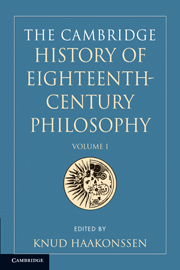Book contents
- Frontmatter
- CONTENTS
- Preface
- Methods of reference and abbreviations
- List of contributors
- I The Concept of Eighteenth-Century Philosophy
- II The Science of Human Nature
- 7 Philosophical Methods
- 8 Human Nature
- 9 Perception and Ideas, Judgement
- 10 Self-Consciousness and Personal Identity
- 11 Reason
- 12 Substances and Modes, Space and Time
- 13 Causality
- 14 Knowledge and Belief
- 15 Scepticism
- 16 Philosophy of Language
- 17 Rhetoric
- 18 Aesthetics
- 19 The Active Powers
- 20 Education
- Biobibliographical Appendix
- Bibliography
- References
17 - Rhetoric
from II - The Science of Human Nature
Published online by Cambridge University Press: 28 March 2008
- Frontmatter
- CONTENTS
- Preface
- Methods of reference and abbreviations
- List of contributors
- I The Concept of Eighteenth-Century Philosophy
- II The Science of Human Nature
- 7 Philosophical Methods
- 8 Human Nature
- 9 Perception and Ideas, Judgement
- 10 Self-Consciousness and Personal Identity
- 11 Reason
- 12 Substances and Modes, Space and Time
- 13 Causality
- 14 Knowledge and Belief
- 15 Scepticism
- 16 Philosophy of Language
- 17 Rhetoric
- 18 Aesthetics
- 19 The Active Powers
- 20 Education
- Biobibliographical Appendix
- Bibliography
- References
Summary
Socrates …in his discussions separated the science of wise thinking from that of elegant speaking, though in reality they are closely linked…. This is the source from which has sprung the undoubtedly absurd and unprofitable and reprehensible severance between the tongue and the brain.
Cicero, De oratore, III.xviTHE RHETORICAL TRADITION AND THE PHILOSOPHICAL CRITIQUE
It may seem strange – it would certainly have seemed strange twenty years ago – to include a chapter on rhetoric in a history of philosophy. Is not rhetoric, the art of fine speaking and unscrupulous persuasion, essentially at odds with philosophy, the pursuit of truth and wisdom? This opinion is as old as Plato’s attacks on the Sophists; it attained new prominence in seventeenth- and eighteenth-century Europe and has dominated thinking about the subject ever since. I shall argue here, in the light of the recent revival of rhetorical studies (including the rehabilitation of the Sophists), that relations between the two disciplines in the eighteenth century were less antagonistic and more complementary than has often been asserted.
Rhetoric and philosophy were ‘disciplines’ in the literal sense of the word: subjects taught in schools and colleges. As a rule, philosophy – which included science – was studied after the supposedly more elementary classes in rhetoric; in the collèges of eighteenth-century France, it was normal for pupils to leave school once their rhetoric was completed, leaving philosophy to specialists. On the other hand, the Renaissance, with its Ciceronian ideal of the orator as universal man, had encouraged a reversal of this order in some establishments, and certain educationalists continued to argue for this on the grounds that good communication presupposes knowledge of the matter to be communicated.
- Type
- Chapter
- Information
- The Cambridge History of Eighteenth-Century Philosophy , pp. 496 - 515Publisher: Cambridge University PressPrint publication year: 2006



